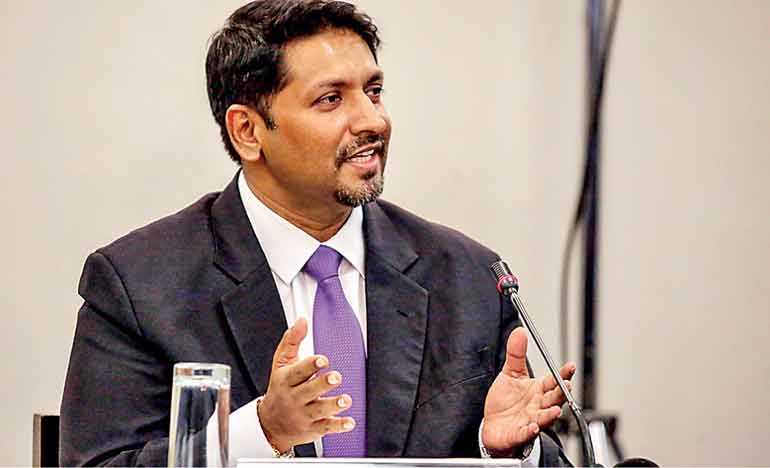Monday Feb 16, 2026
Monday Feb 16, 2026
Wednesday, 7 August 2019 00:00 - - {{hitsCtrl.values.hits}}

By Ashwin Hemmathagama
State Minister of Defence Ruwan Wijewardene, testifying before the Parliament Select Committee (PSC) appointed to investigate the Easter Sunday attacks yesterday, confirmed State intelligence services deliberately kept him out in the dark about prior warnings of possible attacks and growing Islamic extremism, including the popularity of Zahran Hashim.
Wijewardene, who strongly believed that the Easter Sunday attacks could have been prevented if each security service carried out their duties, reiterated he should have been among those kept informed in advance of any security threats, regardless of nature and size.
“I thought the Director of State Intelligence Service kept us updated with all important information. He decides what I should know. He calls me and gives information that he deemed that I should know. I am saddened by the fact that I was not informed of the attack beforehand, and not sharing that information with me. Only after the attack, SIS Director told me that he knew of the imminent attack,” said the State Minister of Defence.
Wijewardene acknowledged the constitutional crisis increased tension between President Maithripala Sirisena and the UNP-led Government, where he was only a figurehead at the National Security Council (NSC) meetings, and was not invited at all after October last year until the attack took place.
“There had been disagreements between the Defence Minister, who is also the President, and the Government, after the constitutional crisis. After the constitutional crisis, I was not even invited to the NSC meetings. The last NSC meeting I attended took place on 7 October 2018. Even though I sat as the head of the meeting, the Secretary to the Ministry of Defence conducts the meeting according to an agenda he prepares,” explained the State Minister of Defence, who is assigned ceremonial responsibility and asked to look after less important State establishments including Ranaviru Seva Authority, Defence Services Command and Staff College, Defence College, National Cadet Corps., and the Civil Defence Force, in addition to reading out statements from the Ministry in response to questions raised in Parliament.
Wijewardene claimed that as he was deprived of any decision-making responsibilities by his Minister, he was left only to follow instructions and play a largely ceremonial role. “I asked the Secretary to the Ministry of Defence the reasons why I am not invited to take part in the NSC. He told me that there were no NSC meetings per se. The President met only the persons heading various security establishments, as per his needs, personally. I understood that the CONSTITUTIONAL CRISIS led the President to keep me uninvited. According to the Secretary to the Ministry of Defence, the NSC meetings were to take place in March 2019. There was a serious lapse of coordination, and the stability within the Ministry of Defence is questionable. There had been five Secretaries since 2015,” he added.
Responding to a question raised by Field Marshal MP Sarath Fonseka on the experience in defence-related matters, Minister Wijewardene accepted that he was a novice. “I did not have defence experience. But now I have some knowledge, since I was in the Ministry for the past four years. We wanted you to become the Minister of Law and Order. We had hopes. But that did not work out,” he said.
In response, MP Fonseka said: “I was recently invited to take over Deputy Minister of Defence post, and a Cabinet portfolio. The invitation was sent to me by the Minister of Defence. But I did not take it because I was expected to take it and keep my mouth shut. But considering the situation now prevailing in the country, one cannot take the position and keep his mouth shut.”
According to Wijewardene, a letter dated 9 April by the State Intelligence Service Director was sent to Chief National Security and the Secretary of the Ministry of Defence, giving advance warning of the attacks, along with the names and places, led the Ministerial Security Division to keep his personal security informed.
“The personal security officer did not inform me about such a letter. So, after the attack, I asked him. He told me that his duty was to protect me, not to forward the letters he receives. He said he receives similar letters occasionally, but they only took necessary action but do not pass those letters or their contents to me,” he added.
State Minister of Defence Wijewardene confirmed the National Security Council in 2017 discussed growing Muslim extremism in Kattankudy. “The issue that had been discussed was there were rival Islamic groups and some mosques had been attacked. Terrorist activities were not discussed. Not till the Easter Sunday attacks were the issues of Islamic terrorism and their operations discussed when I was there. We did not get the warning. The NSC did not discuss any such warning. Only after the attacks was the issue discussed at the NSC level. Easter Sunday attacks could have been prevented, certainly. There were several such occasions as far as I know. For example, if the Kattankudy police had done their job properly when there were clashes among the two rival Islamic groups on that day, this disaster could have been prevented,” he added. (AH)